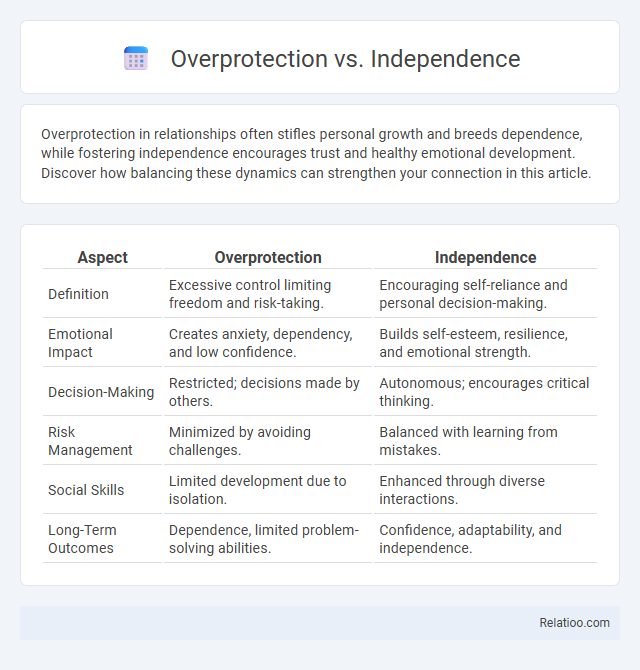Overprotection in relationships often stifles personal growth and breeds dependence, while fostering independence encourages trust and healthy emotional development. Discover how balancing these dynamics can strengthen your connection in this article.
Table of Comparison
| Aspect | Overprotection | Independence |
|---|---|---|
| Definition | Excessive control limiting freedom and risk-taking. | Encouraging self-reliance and personal decision-making. |
| Emotional Impact | Creates anxiety, dependency, and low confidence. | Builds self-esteem, resilience, and emotional strength. |
| Decision-Making | Restricted; decisions made by others. | Autonomous; encourages critical thinking. |
| Risk Management | Minimized by avoiding challenges. | Balanced with learning from mistakes. |
| Social Skills | Limited development due to isolation. | Enhanced through diverse interactions. |
| Long-Term Outcomes | Dependence, limited problem-solving abilities. | Confidence, adaptability, and independence. |
Understanding Overprotection and Independence
Understanding overprotection involves recognizing when excessive control limits a child's ability to develop autonomy and decision-making skills. Encouraging independence fosters resilience and self-confidence by allowing your child to navigate challenges and learn from mistakes. Balancing protection with freedom is essential to support healthy emotional and cognitive growth.
The Psychology Behind Overprotective Parenting
Overprotective parenting stems from a deep-seated fear of potential harm, limiting children's opportunities to develop crucial problem-solving skills and emotional resilience. This psychological approach often results in diminished independence, as children become reliant on parental control rather than learning autonomy. Research in developmental psychology highlights that balanced support fosters competence and self-efficacy while excessive control triggers anxiety and dependency.
Benefits of Fostering Independence in Children
Fostering independence in children cultivates critical problem-solving skills and boosts self-confidence, enabling them to navigate challenges effectively. Encouraging autonomy promotes emotional resilience and decision-making abilities, essential for personal growth and future success. Balancing guidance with freedom helps children develop a strong sense of responsibility and adaptive coping mechanisms.
Signs of Overprotective Behavior
Signs of overprotective behavior include constant monitoring, restricting a child's social interactions, and making decisions on their behalf to avoid any risk or failure. Overprotection stifles independence by preventing the development of problem-solving skills and self-confidence. Recognizing these signs early allows caregivers to balance guidance with fostering autonomy for healthier emotional growth.
The Impact of Overprotection on Child Development
Overprotection can hinder your child's emotional and social development by limiting opportunities for independent decision-making and problem-solving. Excessive control may lead to reduced self-confidence, increased anxiety, and difficulty adapting to new challenges. Balancing guidance with fostering independence is crucial for healthy growth and resilience in children.
Strategies to Encourage Healthy Independence
Encouraging healthy independence in children involves setting clear boundaries while providing opportunities for decision-making and problem-solving to build confidence. Gradually increasing responsibilities tailored to the child's age promotes autonomy and resilience without overwhelming them. Consistent positive reinforcement and open communication foster a supportive environment where children learn to trust their abilities and develop self-reliance effectively.
Balancing Safety and Freedom in Parenting
Balancing safety and freedom in parenting requires a nuanced approach that fosters your child's independence while ensuring appropriate boundaries to prevent overprotection. Encouraging decision-making and problem-solving skills empowers children to build confidence and resilience, essential for their development. Striking this balance minimizes risks without stifling growth, promoting healthy emotional and social maturity.
Long-Term Effects of Overprotection vs. Independence
Overprotection during childhood can inhibit the development of crucial decision-making and problem-solving skills, leading to increased anxiety and dependence in adulthood. Encouraging independence fosters resilience, self-confidence, and adaptability, which contribute to healthier emotional and psychological growth over time. Long-term effects of overprotection often include decreased self-efficacy and difficulty managing stress, while independence promotes stronger coping mechanisms and autonomy.
Tips for Transitioning from Overprotection to Independence
Gradually increasing responsibilities and decision-making opportunities fosters confidence and autonomy in individuals transitioning from overprotection to independence. Encouraging safe risk-taking and supporting problem-solving skills helps build resilience and self-efficacy. Clear communication of expectations and consistent positive reinforcement solidify gradual progress toward self-reliance.
Building Resilient and Self-Reliant Children
Balancing overprotection and fostering independence is crucial for building resilient and self-reliant children, as excessive shielding can hinder their problem-solving skills while encouraging autonomy promotes confidence and decision-making abilities. Studies show that children exposed to manageable challenges develop stronger emotional regulation and adaptability, which are essential traits for resilience. Parents and educators should provide supportive environments that allow safe risk-taking and responsibility, thereby cultivating self-efficacy and lifelong independence.

Infographic: Overprotection vs Independence
 relatioo.com
relatioo.com